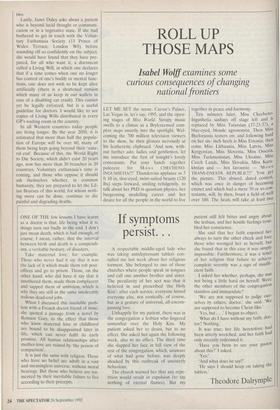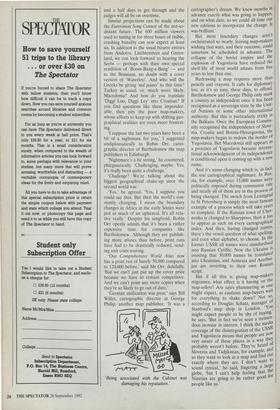ROLL UP THOSE MAPS
Isabel Wolff examines some
curious consequences of changing national frontiers
LET ME SET the scene. Caesar's Palace, Las Vegas in, let's say, 1995, and the open- ing stages of Miss World. Syrupy music swells to a climax as a Brylcreemed com- pere steps smartly into the spotlight. Wel- coming the 700 million television viewers to the show, he then glances nervously at his leatherette clipboard. 'And now, with- out further ado, ladies and gentlemen, let me introduce the first of tonight's lovely contestants. Put your hands together puleeeze for M-i-s-s CHECHENO- INGUSHETIA!!!' Thunderous applause as 5 ft 10 in, sloe-eyed, swim-suited beauty (120 Ibs) steps forward, smiling refulgently, to talk about her PhD in quantum physics, her burgeoning modelling career and her desire for all the people in the world to live
together in peace and harmony.
Ten minutes later, Miss Checheno- Ingushetia sashays off stage left and is replaced by Miss Tatarstan (37-23-37), a blue-eyed, blonde agronomist. Then Miss Byelorussia teeters on; and following hard on her six- inch heels is Miss Estonia; then come Miss Lithuania, Miss Latvia, Miss Kyrgyzstan, Miss Slovenia, Miss Ossetia, Miss Turkmenistan, Miss Ukraine, Miss Czech Lands, Miss Slovakia, Miss Kaza- khstan and — hot favourite — `M_i-s-s TRANS-DNESTR REPUBLIC!!!' You get the picture. This absurd, dated contest, which was once in danger of becoming extinct and which had a mere 70 or so con- testants, will, by then, boast a field of well over 100. The heats will take at least two
and a half days to get through and the judges will all be on overtime.
Similar projections can be made about the Eurovision Song Contest of the not-so- distant future. The 600 million viewers used to tuning in for three hours of risible, crushing banality can now expect at least six. In addition to the usual bizarre entries from Andorra, Liechtenstein and Green- land, we can look forward to hearing the Serbs — perhaps with their own special rendition of 'Boom-Bang-a-Bang' — and to the Bosnians, no doubt with a cover version of 'Waterloo'. And who will the Greeks be giving `nul points' to this time? Turkey as usual, or, much more likely, Macedonia? And how do you translate `Diggi Loo, Diggi Ley' into Croatian? If you find questions like these imponder- able, then pity the poor map-makers, whose efforts to keep up with shifting geo- graphical realities are even more frustrat- ing.
'I suppose the last two years have been a bit of a nightmare for you,' I suggested undiplomatically to Robin Orr, carto- graphic director of Bartholomew the map publishers in Edinburgh.
Nightmare's a bit strong,' he countered, phlegmatically. 'Challenging, maybe. Yes, it's really been quite a challenge.'
`Challenge? We're talking about the biggest geographical shake-up since the second world war.'
'Yes,' he agreed. 'Yes, I suppose you could say that. But then the world's. con- stantly changing. I mean the boundary changes in Africa in the early Sixties were just as much of an upheaval. It's all rela- tive really.' Despite his sangfroid, Robin Orr openly admits that it's been a rather expensive time for companies like Bartholomew. Although they are publish- ing more atlases than before, print runs have had to be drastically reduced, send- ing unit costs soaring.
`Our Comprehensive World Atlas now has a print run of barely 50,000 compared to 120,000 before,' said Mr Orr, dolefully. `But we can't just put up the cover price because we have to remain competitive. And we can't print any more copies when they're so likely to go out of date.'
'German unification was great,' says Bill Willet, cartographic director at George Philip, another map publisher. 'It was a 'Being associated with the Cabinet was damaging his reputation.' cartographer's dream. We knew months in advance exactly what was going to happen, and on what date, so we could all time our new editions to incorporate the change. It was brilliant.'
But most boundary changes aren't orchestrated so neatly, leaving map-makers wishing that wars, and their outcome, could somehow be scheduled in advance. The collapse of the Soviet empire and the explosion of Yugoslavia have reduced the shelf-life of most world atlases from five years to less than one.
Redrawing a map requires more than pencils and crayons. It calls for diplomacy too, as it's so easy, these days, to offend. Bartholomew and George Philip only mark a country as independent once it has been recognised as a sovereign state by the Unit- ed Nations or some other international authority. But this is particularly tricky in the Balkans. Once the European Commu- nity recognised the independence of Slove- nia, Croatia and Bosnia-Hercegovina, the map-makers began to redraw the border of Yugoslavia. But Macedonia still appears as a province of Yugoslavia because interna- tional acknowledgment of its independence is conditional upon it coming up with a new name.
And it's name-changing which is, in fact, the real cartographical nightmare. In Rus- sia, for example, over 15,000 names were politically imposed during communist rule and nearly all of them are in the process of being changed. The switch from Leningrad to St Petersburg is simply the most famous example of a process which will take years to complete. If the Russian town of Cher- nenko is changed to Sharypovo, then it has to appear as such on every cartographical index. And then, having changed names, there's the vexed question of what spelling, and even what alphabet, to choose. In the former USSR all names were standardised into Russian Cyrillic. Now the Ukraine is insisting that 30,000 names be translated into Ukrainian, and Armenia and Azerbai- jan are reverting to their own Roman script. But if all this is giving map-makers migraines, what effect is it having on the Map-sellers? Are sales plummeting as one might expect, as cautious map-buyers wait for everything to shake down? Not so, according to Douglas Schatz, manager of Stanford's map shop in London. Y°I.1, might expect people to be shy of buying, he says. 'But in fact we've seen a tremen- dous increase in interest. I think the media coverage of the disintegration of the USSR and Yugoslavia means that people are now very aware of these places in a way they probably weren't before. They've heard of Slovenia and Tadjikistan, for example, and so they want to look at a map and find out exactly where they are. I don't want to sound cynical,' he said, fingering a large globe, 'but I can't help feeling that the Nineties are going to be rather good for people like us.'



































































 Previous page
Previous page